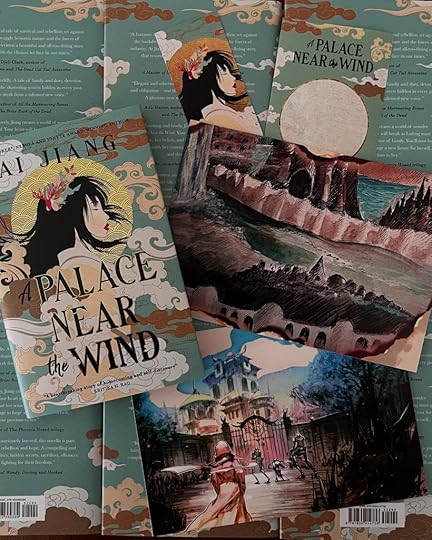Book review – A Palace Near the Wind by Ai Jiang
I have long been fascinated by Chinese culture. It’s all those layers and hidden meanings, then the hidden meanings behind the hidden meanings. You think you grasp something, then look at it a little deeper, and realise what you were ‘grasping’ was only the tip of the iceberg. You weren’t wrong. You just weren’t seeing the whole picture. This concept permeates virtually everything, but is particularly prevalent in fiction. Words are building blocks, after all. The problem is, Chinese doesn’t translate very well to English. The surface meaning usually carries over and can be translated in a literal sense, but many of the nuances and deeper connotations are lost. Ostensibly Chinese is quite a direct, pragmatic language, but the written word works on multiple levels.
Take A Palace Near the Wind, for example, the first in the Natural Engines series, by Canadian/Chinese writer Ai Jiang. The plot follows Liu Lufeng, a Feng princess destined to become the next bride of a king with which her people have made a binding agreement. With bark faces, branches for arms, and sap running through their veins, the Feng people are more tree than human, and part of the very land on which they exist. However, they are under threat of human expansion, the negotiation of bride-wealth being the only way to delay the destruction of their home. Lufeng decides that it ends with her, and come her wedding day, plans to kill the king and set her people free. But while preparing for the ceremony, she learns that things are not quite as they seem.

Ostensibly, this is a tale of high fantasy. But I have also seen it described as folk horror, science fiction, and even eco-fiction, which is a new one on me. True, there is a message here, and poignantly, it is even dedicated to ‘Mother Nature and all her unwilling sacrifices.’ That is also possibly a little nod to another of the book’s themes, because alongside the threads of duty, hope, discovery, and coming-of-age, are darker themes, such as rebellion, fear, and sacrifice. It culminates in the realisation that the way we percieve things is often skewed or distorted, and sometimes coloured by our own expectations or prejudices. The world-building is enchanting, and the word selection exemplary. But as other-worldly as it is, you are made to feel right there with Lufeng, and even though she’s (at least) half tree, you can’t help rooting for her (sorry).
Like a lot of outstanding fiction, A Palace Near the Wind lends itself to many genres but ties itself to none. This in itself instills a vague sense of displacement or lack of belonging within the reader, something mirrored throughout the book. You can’t help but wonder whether this is a conscious or subconscious effect of the author’s background. The duality of belonging to two places at once, of being the same yet different, reconciling the doubts and insecurities that can arise when one considers their role in the world, balancing the desire to fit in yet stand apart, and knowing when to compromise and when to fight.
I first became aware of Ai Jiang’s work several years ago when we both had stories in the same anthology. Back then she was a student in Edinburgh, and though just starting out, you just knew she was going to be something special. The short story Give me English (currently being novelised, I believe) was my gateway. You can check that out here. I was curious to see how she would adapt to long-form fiction. Her work is usually sharp and precise, but very intense and filled with tiny little daggers. She barely wastes a syllable, honing each word until it hits just right. I wanted to see if she could or would carry this style through, or whether a novel, albeit a short one, would provide more room to explore and elaborate. This is probably one of those timeless books that you could read again in a couple of years time and take something different from it. I’ll let you know if that turns out to be true.
A final word needs to go to the packaging and artwork. They say you shouldn’t judge a book by its cover, but it’s impossible not to when the cover is this beautiful. Rarely do you see such meticulously appropriate artwork accompanying anything, let alone a book.
A Palace Near the Wind is out now on Titan Books.



